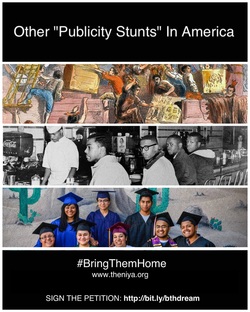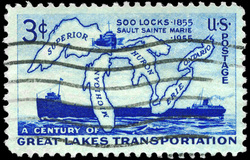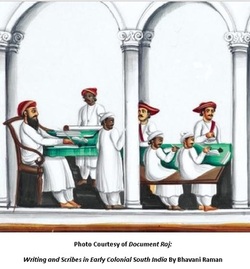
The second trigger was an article by a well-regarded immigration lawyer describing the DREAM9 action as a "publicity stunt" and "flippant" behavior, when the focus should be on enacting comprehensive immigration reform. He also expressed doubt that the three Dreamers who left the U.S. would qualify for readmission under the asylum laws or humanitarian parole.
All sorts of nastiness ensued. Some protested that the lawyer had no right to criticize since he is not a Dreamer, while others suggested to these critics that the lawyer, as a citizen, has a higher right to speak under the First Amendment than undocumented protesters and their equally paperless supporters. Both sides on this spat are wrong -- the First Amendment applies to everyone in the United States.
The DREAM9 have reportedly been denied parole into the United States (the discretionary power of the government to admit individuals on a case by case basis under § 212(d)(5)(A) of the Immigration and Nationality Act for urgent humanitarian reasons or significant public benefit). Shuttled off to the Eloy, AZ detention center as civil detainees, the DREAM9 sit in custody or solitary confinement, while they prepare to request asylum in the United States and participate in a hunger strike to protest detention conditions generally.
As this dust-up shows, there have been collateral damage and casualties in this war of words, not the least of which are our nation's deservedly maligned, and mostly misunderstood immigration laws, as well as our tradition of activism and civil disobedience to spur changes in law and policy. The lawyer (whom I respect) is right to consider the fine points of immigration law, but wrong to publicly prejudge the outcome of their requests for asylum and humanitarian parole since he is not privy to the facts.
Certainly, a case can be conceived of compelling humanitarian grounds and significant public benefits upon which to grant humanitarian parole or asylum. They have lived, been educated and are like the everyday Americans among whom they grew up. Crime in Mexico, especially kidnappings of wealthy Mexicans or American tourists or those perceived as such have been acknowledged by the U.S. Department of State ("The number of kidnappings and disappearances throughout Mexico is of particular concern. Both local and expatriate communities have been victimized. In addition, local police have been implicated in some of these incidents").
Moreover, throughout American history our immigration laws have reflected the political sentiments of the times -- from the Alien and Sedition Act, the Chinese Exclusion Act, and our modern day Immigration and Nationality Act, a McCarthy-era law focused on preventing Communists from entering the country, to the Cuban Adjustment Act and the Chinese Student Protection Act. Immigration law and politics are inextricably bound, as these Dreamers know well, given the Obama Administration's use of executive power to create the program known as DACA (Deferred Action for Childhood Arrivals) just in time to favorably influence the 2012 presidential election.
No less than voting, political protests and civil disobedience put pressure on the system, not just on the President. House leaders Cantor and Ryan have changed their tune to recognize a benefit for Dreamers. They now acknowledge the unfairness of depriving innocent youth who've lived like Americans their whole life a path to legality.
It's way too soon to critique the methods used by the DREAM9 and their supporters when immigration policy arguments are in flux. I commend them for their bravery and for their willingness to shed light on the whole rotten detention and removal system that needs to be reformed from its core. Criticizing these kids distracts from the real targets of criticism -- the dysfunctionality of the immigration laws, the prison-industrial complex and the border-focused government-contractor giveaway.
Or as another respected immigration lawyer reminded me, Frederick Douglas said:
| Let me give you a word of the philosophy of reform. The whole history of the progress of human liberty shows that all concessions yet made to her august claims have been born of earnest struggle. The conflict has been exciting, agitating, all-absorbing, and for the time being, putting all other tumults to silence. It must do this or it does nothing. If there is no struggle there is no progress. Those who profess to favor freedom and yet deprecate agitation are men who want crops without plowing up the ground; they want rain without thunder and lightning. They want the ocean without the awful roar of its many waters. |









 RSS Feed
RSS Feed
